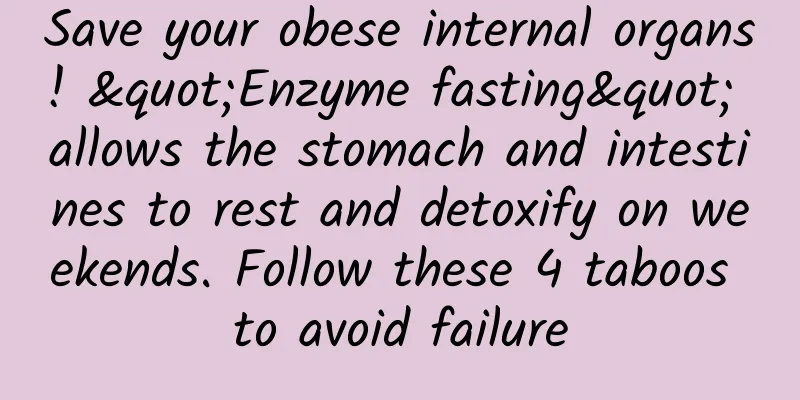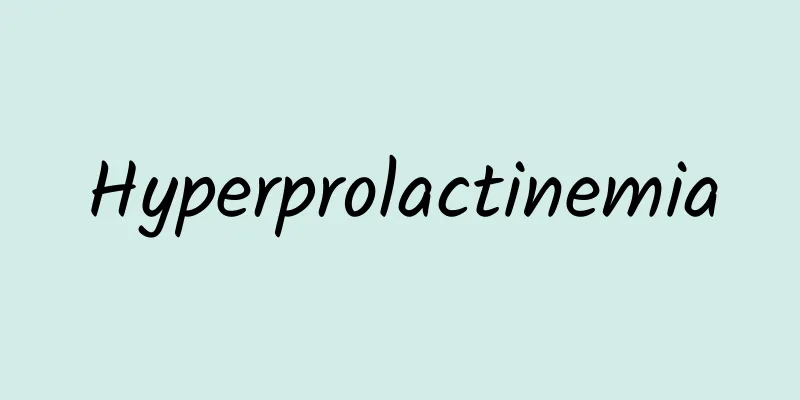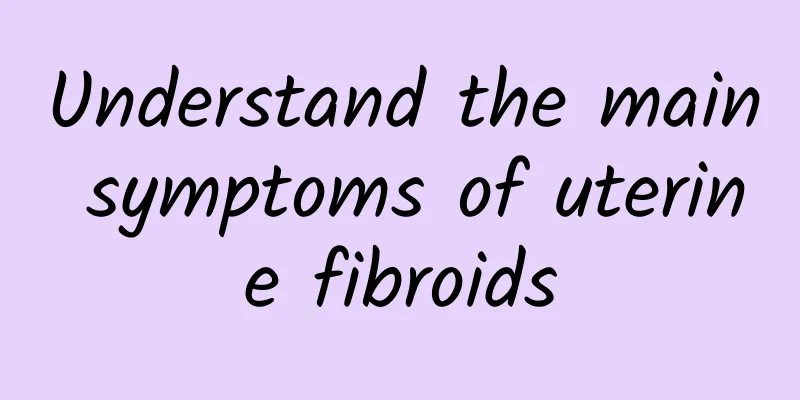Save your obese internal organs! "Enzyme fasting" allows the stomach and intestines to rest and detoxify on weekends. Follow these 4 taboos to avoid failure

|
After eating and drinking excessively during consecutive holidays, you have gained weight and your weight has soared. What should you do in the face of this uninvited fat? In fact, as long as you use the enzyme fasting method of "let the gastrointestinal tract rest for 3 days, cooperate with enzyme juice, and detoxify on the weekend!", you will not only not reduce your food intake, but you can let the internal organs rest through fasting, excrete old waste materials and toxins in the body, restart the body, control your weight, and even get rid of minor physical ailments! In recent years, "enzyme fasting" has transformed from "the newest and most powerful weight loss method" to "the way to achieve real health." Why are enzymes so important? In the book "Detoxification through Drinking Enzyme Fasting" written by the Japanese Enzyme Fasting Research Committee, it is stated that the human body is always repeating the cycle of "digestion → absorption → transportation → metabolism → excretion", and it is "enzymes" that support this cycle. Among the enzymes operating in the body, there are "digestive enzymes" responsible for digestion and absorption, and "metabolic enzymes" related to metabolism, elimination of harmful substances, enhancement of self-healing and immunity, cell repair and restart. Fasting inhibits the functioning of digestive enzymes and activates metabolic enzymes The human body will mainly utilize digestive enzymes, while metabolic enzymes will only consume trace amounts. Therefore, digestive enzymes will reduce the efficiency of metabolic enzymes, resulting in the inability to repair problematic cells and the inability to allow metabolism to proceed smoothly, causing chronic physical discomfort, unexplained general weakness, obesity, and lifestyle diseases. Enzyme fasting is not only a way to save your internal organs, but it can also inhibit the functioning of digestive enzymes, activate metabolic enzymes, and promote cell repair. Therefore, it can also play a restarting effect, improving skin quality and enhancing immunity. And you can expect a detoxification effect, excrete harmful substances, optimize the intestinal environment, improve liver function, and promote fat burning. During the enzyme fasting preparation period, choose low-calorie meals based on plant-based foods such as tofu and natto, soy products, vegetables, and seaweed. Enzyme fasting preparation period: 3 days to 1 week. Pay attention to a nutritionally balanced diet! Before starting enzyme fasting, if your body and mind are prepared, you can create an internal environment where metabolism is smooth and fat is easily burned. The key is to use about 3 days to 1 week as a preparation period for enzyme fasting. During the preparation period, choose low-calorie meals based on plant-based foods such as tofu and natto, vegetables, and seaweed. When eating out, replace Western meals with Japanese set meals or soba noodles, and choose meals that are nutritionally balanced and easy to digest as much as possible. 【4 taboos of enzyme fasting】 The night before the enzyme fast, you must avoid eating fat and meat. End your fast with a light meal before 8pm the night before. Same as the meals during the preparation period, especially avoiding fats and meats. During the enzyme fasting period, you are not allowed to eat at all. Overeating and consuming foods such as high-fat, high-calorie cakes or alcohol are strictly prohibited. Avoid caffeinated drinks such as coffee, black tea or green tea during enzyme fasting For example, caffeinated drinks such as coffee, black tea or green tea, other beverages and snacks with high fat content, candies, alcohol or cigarettes, etc., will cause a burden on the body and make the efforts of enzyme fasting come to naught, so they should be avoided. During enzyme fasting, only fermented drinks, water, decaffeinated herbal tea, etc. can be consumed. Day 1 of enzyme fasting: Make sure to drink enough water and pay attention to your physical condition. Day 1 of fasting: Make sure to drink enough water and pay attention to your physical condition You may feel hungry and greedy around the first night, but your appetite will decrease on the second day and you will feel more relaxed. Please remember to drink plenty of water and check your physical condition and bowel movements. After starting enzyme fasting, the highest blood pressure (systolic blood pressure) will drop significantly, while the lowest blood pressure (diastolic blood pressure) will tend to drop slowly. In addition, since you are not eating, your blood sugar level and total cholesterol will also drop. People with high triglycerides will see a decrease, and people with low triglycerides will see an increase. The digestive function comes to a halt and the body begins to operate in an unprecedented mode. Although it will not affect your normal life, you should not force yourself. You can take a bath, but you must avoid saunas or long periods of high-temperature baths. Day 2 of fasting: Toxins are excreted and improvement begins to occur Although it varies from person to person, improvement will begin to appear around the second day. There are different symptoms such as skin changes such as eczema or growths, discharge from the eyes, the body becoming heavy, drowsiness, diarrhea, large bowel movements, nausea, fever, etc. These symptoms are all meant to activate cells, excrete toxins, and restore functions. If the symptoms are mild, please relax, continue enzyme fasting, and let the toxins be excreted slowly! If you are unable to rest due to work or other reasons, please take a recovery meal to interrupt the fast. If the body is in the period of converting carbohydrates into fat, it will cause headaches. But when body fat is converted into energy, you will not feel uncomfortable due to fasting. During the enzyme fasting recovery period, start by eating porridge that has been cooked until soft. Day 3 of fasting: Cells activated, body and mind become lighter Old waste materials in the body gradually disappear. Because there is no food intake, the blood flow to the gastrointestinal tract for digestion becomes less, and the energy previously invested in digestion is now used to repair cells and tissues. The cells are thus activated, detoxification is promoted, and the cells resume their original functions and become normal cells. Because these cells are detoxifying and recovering, you may continue to see improvements, and you may also feel a surge of energy in your body. At this stage, the desire to eat almost disappears, the body and mind feel lighter, and you will also feel the refreshment brought by fasting. The enzyme fasting recovery period starts with porridge that is cooked until soft. The first meal after the end of enzyme fasting is called the recovery diet period, which is the period for returning to the original diet. Since the intestinal environment has been restarted, immediately consuming solid, high-calorie or high-fat foods will cause visceral burden. Start with porridge that is cooked until soft, then gradually return to your normal diet. People who are not suitable for enzyme fasting Enzyme fasting is not recommended when you are pregnant, in poor health, or taking medication. In addition, people with a history of myocardial infarction or stroke, or people with certain conditions or diseases of the heart, lungs, liver, kidneys, gastrointestinal tract, etc. are not suitable. Children under junior high school age whose bodies are not fully developed should not undergo enzyme fasting. |
Recommend
Why does adenomyosis cause pain?
Why does adenomyosis hurt? Patients with adenomyo...
Joint numbness and pain in winter, is it due to "old cold legs"? Drink this tea to get rid of dampness and cold, and do this Ba Duan Jin to build muscle
As winter temperatures drop and it rains occasion...
How to use medicine for multiple uterine fibroids How to use medicine for multiple uterine fibroids
1. Follow-up observation: If the patient has no o...
The paper girl has not had menstruation for 3 years! Doctor: Losing more weight may lead to infertility
A 25-year-old lady who is as thin as a "pape...
What are the characteristics of bleeding from uterine fibroids? What kind of blood is bleeding from uterine fibroids?
What are the characteristics of bleeding from ute...
Fallopian tube inflammation is usually the key to causing ectopic pregnancy
Fallopian tube inflammation is usually the key to...
Why is there redness and swelling below during menstruation?
Why does redness and swelling occur during menstr...
What is the cause of premature ovarian failure?
What are the causes of premature ovarian failure?...
How to improve the thickness of the endometrium?
In life, some women have endometrial thickening, ...
Get rid of stress fat with this nutritionist’s secret 3-minute stress-relieving drink!
Do you also like to relieve stress by eating and ...
Metabolism is fast and weight loss is fast, the beauty witch reveals the secret weapon! Chinese medicine practitioner Wu Mingzhu reveals: Secret techniques for accelerating metabolism and detoxification
Modern people's irregular diet, lack of exerc...
What are the diagnostic methods for vaginitis?
What are the diagnostic methods for vaginitis? Wh...
Detailed explanation of the characteristics of cervical cysts
Cervical cyst is one of the more common gynecolog...
What exactly is painless abortion? What are the categories of painless abortion?
Abortion is a way to help women terminate pregnan...
Symptoms of miscarriage in early pregnancy
The early pregnancy is a very important stage. Af...









